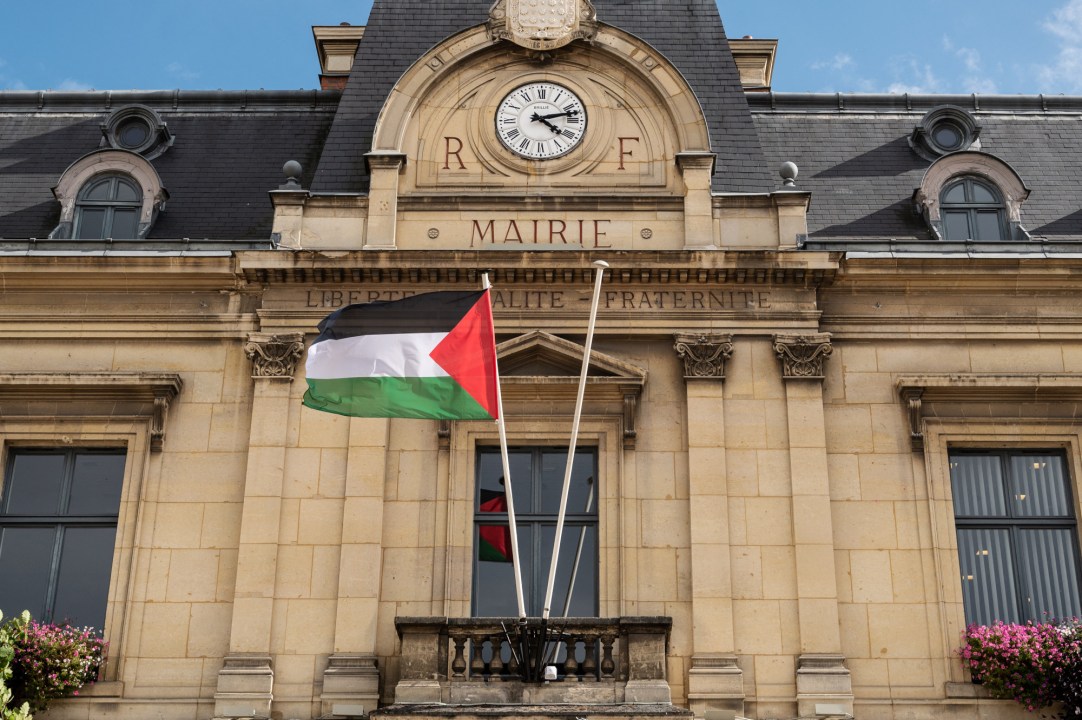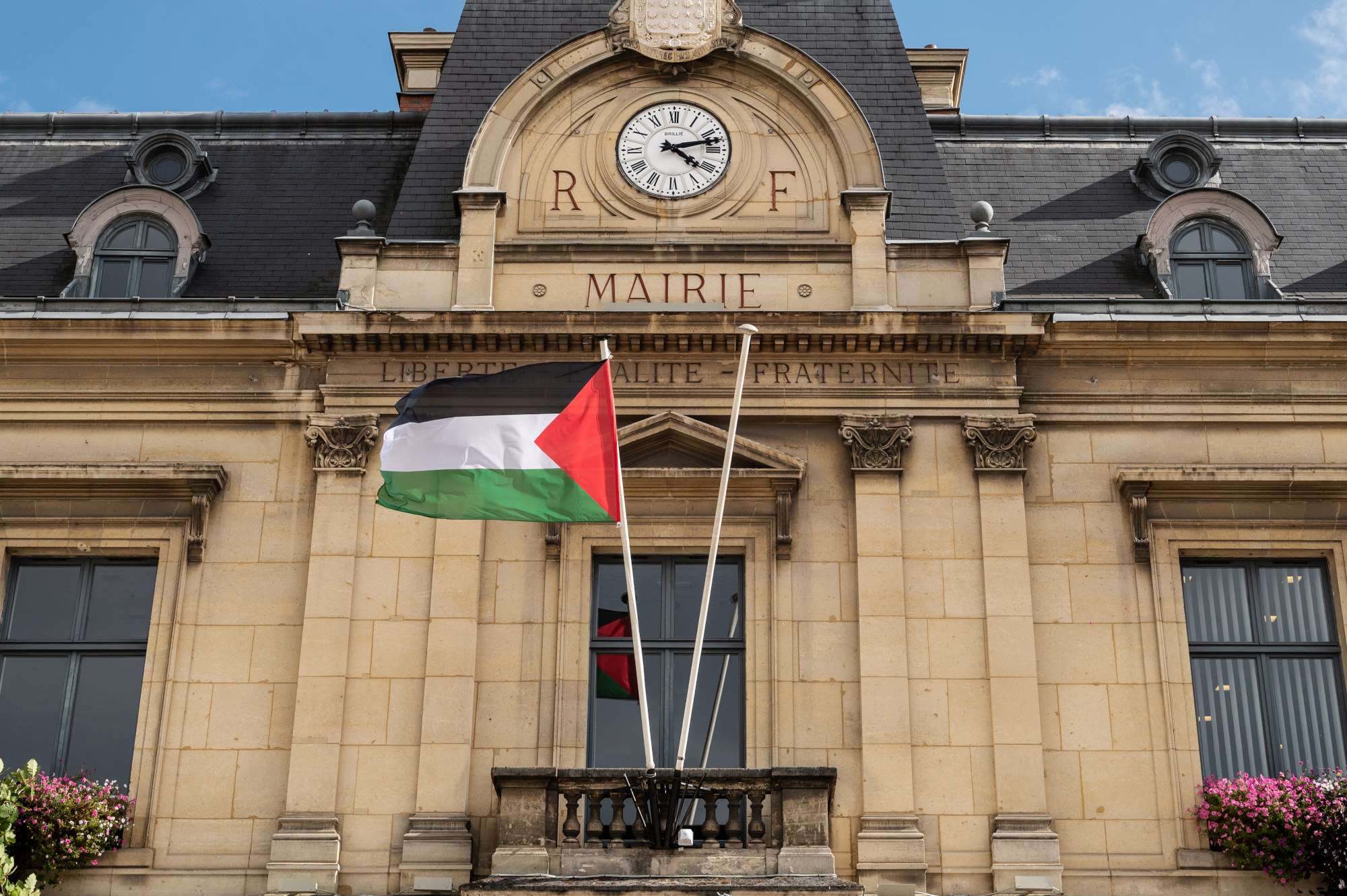As Emmanuel Macron took to the global stage to recognise Palestine at the UN, over 80 defiant left-wing mayors back home turned their town halls into protest zones, draping them with Palestinian flags in open rebellion against a government ban. They call it solidarity. In truth, it’s brazen political theatre. Outgoing interior minister Bruno Retailleau had rightly ordered prefects to halt this, declaring public spaces must stay neutral, not tools for the left’s divisive games.
By turning their buildings into platforms for international causes, town halls betray the very neutrality that holds the Republic together
In France, raising a Palestinian flag has become less about the Middle East than domestic politics, a way for the left-wing to posture. Jean-Luc Mélenchon and La France Insoumise (LFI) are using the symbolism of the Palestinian flag to mobilise immigrant communities and to carve out a permanent role for themselves as the voice of the banlieues. The flag is now brandished not only at pro-Palestinian rallies, but at demonstrations against austerity, pensions and the police. It’s been transformed into a banner of revolt against the Republic itself.
The consequences are dangerous. France is already facing a surge in anti-Semitism. In the first half of the year the country recorded 646 anti-Semitic acts, more than double the number reported in the same period of 2023. The Shoah memorial in Paris was vandalised, as was a Holocaust monument in Lyon. Rabbis have been attacked in the street, and it seems like every week that Jewish-owned businesses are tagged or attacked. The outgoing justice minister, Gérald Darmanin, has called for ‘very firm criminal action’ against the perpetrators.
Draping town halls in the Palestinian colours is just inflaming these tensions. It signals alignment with one side of a bitter foreign conflict and legitimises hostility towards Jewish communities. At a moment of fragile national cohesion this kind of symbolism is reckless. Retailleau’s instruction to prefects is fully justified. Banning the flag on public buildings isn’t an attack on Palestine, but action taken in defence of France.
There have been court orders to take down Palestinian flags in Grabels and Malakoff, but rebels like Saint-Denis’s Mathieu Hanotin have kept them flying. The hard left now vows further appeals, framing the ban as repression to rally their base. This escalation proves Retailleau’s point. The flag is being used as a weapon of division, not unity.
Retailleau remains acting interior minister while prime minister Sébastien Lecornu finalises the new government. Retailleau’s flag ban is a way of asserting authority at a moment when portfolios and influence are still being negotiated. By seizing on this controversy, he underlines his claim to embody order, and to draw a clear line where the left blurs it.
Olivier Faure of the Socialist party has accused Retailleau of symbolically opposing Macron’s foreign policy. He’s called directly on Macron to reverse the ban which the left characterise as petty. Paris senator Ian Brossat denounced Retailleau of siding with Netanyahu’s supporters. On social media, the ban has been branded authoritarian and hypocritical, with critics pointing to the fact that Ukrainian flags have been allowed. Retailleau’s allies argue that keeping public buildings clear of partisan symbols is essential.
France’s highest administrative court, the Conseil d’État, has long been clear that public institutions must observe strict neutrality. Hoisting the Palestinian flag from a mairie is as much a breach of that principle as raising the Catalan or Kurdish colours. Once neutrality is abandoned, town halls cease to belong to all citizens and become tools of factional politics.
That’s precisely what the hard left wants. Mélonchon’s LFI thrives on division. By embracing the Palestinian cause, he aims to polarise society and to lock in immigrant communities as a permanent constituency for his party.
The left’s reliance on these tactics betrays its bankruptcy. It has little serious to say on security, or on the daily realities of governing. So it substitutes symbols for substance. Mayors elected to manage schools, housing and local services climb onto the international stage instead, hoisting flags in pursuit of relevance. They exploit foreign tragedy to cover their own failures at home.
There is, of course, a serious debate to be had about France’s foreign policy in the Middle East. But that debate belongs in the National Assembly and in the Élysée, not on the façades of provincial town halls. Local mayors are elected to run schools, manage housing, and keep the streets safe. They’re not elected to conduct foreign policy. By turning their buildings into platforms for international causes, they betray the very neutrality that holds the Republic together.
The Palestinian cause deserves better than this. To hang the flag on French town halls is to use it for partisan ends. In the process, the left undermines cohesion, fuels division and feeds anti-Semitism. The tricolore is the symbol of the Republic. It unites. The Palestinian flag, in France today, has been turned into a political weapon in the hands of the hard left, wielded to divide rather than heal. Retailleau is right to call time on this. Unfortunately, the left has seized on the ban itself as a new cause, casting it as repression to rally their base and deepen France’s fractures. This cannot be allowed, especially as anti-Semitic incidents surge. The Republic must hold firm, keeping public spaces free of partisan symbols and preserving the neutrality that binds the country together.









Comments